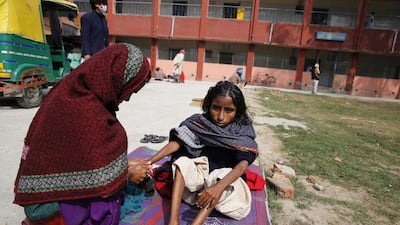MUMBAI // India’s government this month announced plans to eradicate tuberculosis, one of the major causes of death in the country, within eight years, but experts say the target will be hard to achieve given the prevalence of the disease and the emergence of drug-resistant TB.
Eradicating tuberculosis in India is “a mammoth task”, said Salil Bendre, head of pulmonary medicine at Nanavati Super Speciality Hospital in Mumbai.
Figures from the World Health Organisation (WHO) show there were 2.8 million new cases of tuberculosis in 2015, up from 2.2 million in 2014. That is the highest of any country in the world and more than a quarter of the 10.4 million new patients globally in 2015.
There were 480,000 TB deaths in India in that year, according to the WHO.
Tuberculosis is among a range of diseases targeted for eradication by the government as it announced a 23 per cent increase in health spending in the annual federal budget unveiled on February 1. They include leprosy, the mosquito-borne illnesses filariasis and black fever, and measles. India’s last success in disease eradication was with polio in 2014.
In the case of TB, however, experts say eliminating the disease by 2025 will be difficult, even though the drastic jump in cases actually reflected improvements in the government’s handling of the problem.
“The detection of TB is better … but the new occurrence of the disease is stable and has not changed over the years,” said Kirti Sabnis, an infectious disease consultant at Fortis Hospital in Mumbai.
Dr Sabnis said that the authorities had stepped up efforts to combat tuberculosis and were reaching patients in India’s villages and slums with education programmes and better access to diagnostics.
“A strong reason for the rise in the number of cases is that TB notification has been made compulsory,” said Dr Bendre. Besides this, “TB patients from the lower strata of society can now avail of advanced diagnostic facilities owing to government health plans. The TB control programme has reached the interiors of India,” he said.
Tuberculosis is highly contagious bacterial disease that most commonly affects the lungs, although it can be found in any part of the body. It largely affects poorer sections of society, but anyone with a weak immune system is susceptible. It is spread through droplets in the air via coughing and sneezing.
Although the Indian government provides free medication for TB, the problem of patients not taking their medicine regularly or stopping treatment early has led to the rise of multidrug-resistant TB, or MDR-TB.
“Drug resistance to TB is a sinister situation,” Dr Bendre said. “With newer diagnostic techniques, there is an early detection of drug resistance in TB cases, which have seen a rise in recent times.”
People with MDR-TB can easily infect others with the same drug-resistant strain of TB, he said.
According to the WHO, there were 79,000 MDR-TB cases in India in 2015.
It takes about six to eight months to treat ordinary TB, but treatment of MDR-TB takes at least two years and can require more specialised drugs that are not always easily available.
A teenager suffering from MDR-TB last month won a court case to get access to a new drug called bedaquiline, which the government currently gives only to patients in a few cities in India. The government has said it was regulating supply of bedaquiline in part to prevent it from being used improperly, thereby allowing the development of TB strains resistant to the new drug.
Maximiano D’Sa, who oversees the TB control programme of the Goa state health department, said drug-resistant TB would be a big obstacle to achieving the government’s eradication target.
“It’s a big problem. It’s predicted that it is going to be a major thing over the country. There’s a likelihood that if it’s not controlled in time it could spread out.”
He said MDR-TB patients remained contagious for several months even after beginning treatment.
Dr Sabnis said the government could still do more to wipe out TB, such as in the area of rapid diagnostics. She suggested partnerships with private hospitals and labs to offer free diagnosis to patients.
Along with many TB cases continuing to go unreported and undetected, India has several factors that fuel the spread of the disease.
“Factors like overcrowding and increasing population trigger the rapid spread of TB in a community,” Dr Bendre said. “Increasing prevalence of diabetes increases the threat of TB as diabetes suppresses immunity levels and causes the reactivation of latent TB.”
Raising awareness was key to wiping out the disease and would have to involve the government and private and public sectors working together, he added.
foreign.desk@thenational.ae

